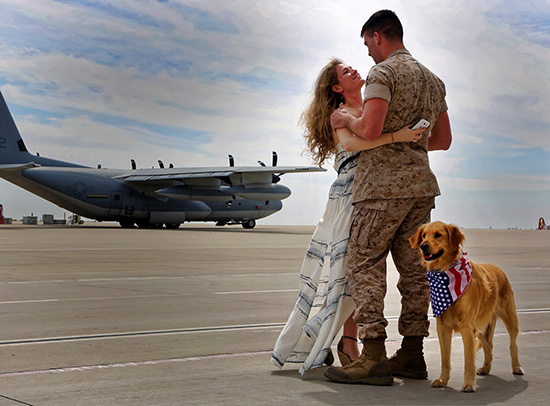Through The Eyes of Three Generations: A Military Child’s Perspective by Sarah Meyers
Article preview:
In this moving reflection, a second-generation military child shares how emotional intelligence is shaped across three generations—through childhood goodbyes, a parent’s deployment, and now raising a daughter on the homefront. From missed milestones to quiet acts of resilience, this story honors the often unseen strength of military children.
In military and frontline families, goodbyes aren’t merely moments—they’re milestones. “Goodbye. I love you. Be safe.” These aren’t just words; they’re lifelines repeated at doorways, shouted across tarmacs and etched deeply into our children’s hearts. These moments are essential to protecting our freedom and the everyday life many take for granted.
As we observe the Month of the Military Child, I reflect on the layered impact of this life across generations. What does it mean to grow up with constant change, missed birthdays and heartfelt hugs at airport gates? What does it mean to hold down the fort—over and over again?
Enduring these hardships shapes not only us but strengthens the next generation. As C.S. Lewis wrote, “Hardship often prepares an ordinary person for an extraordinary destiny.” Military children learn lessons and forge emotional tools tucked away for critical moments. One thing never changes: Saying goodbye never gets easier.
My father was the child of an Air Force dentist. I was raised by dual Air Force officers whose combined service spanned 57 years. Now, my daughter represents the third generation of military children in our family—learning to shoulder emotional weights unimaginable to many.
Her initiation began early. At just three weeks old, she said goodbye to her father for the first time. She couldn’t yet speak or walk; that moment marked her first trial as a military child. Before her sixth birthday, annual deployments became routine. She learned to recognize subtle emotional shifts as departures approached, understanding when it was her turn to support me—usually with extra treats and bedtime cuddles.
Although I cannot fully express the feelings my father or daughter experienced, I vividly recall my own. There are moments when you realize the role you play at home is bigger than yourself. And there are moments when you feel like a grain of sand in a vast ocean, adrift in the unknown, waiting for the waves to settle. I remember my moments as a military child—watching my mom take phone calls that sometimes brought difficult news. She tried to hold it in, but I always sensed the dark cloud settling over her. She would retreat to her room, and the tears came quietly. The house went still. I knew then it was my turn to help carry the weight: to comfort her, prepare food and find ways to distract us until Dad returned safely. It was a skill I quietly tucked away, one I drew on years later when my spouse deployed.
Sept. 11 changed everything. I still remember my father walking out the front door in uniform, our family clinging to him in a tight embrace, holding back tears and holding onto faith. Like many American families, we summoned emotional fortitude and pushed forward. As the War on Terror began, we weren’t just saying goodbye—we were stepping into the unknown. Months into his deployment, my father, a fighter pilot, sent us photos to stay connected. In one, he stood beside two bombs: one labeled “from Mom,” and the other, smaller one, “from Sarah.” In his own way, he made us feel part of the mission. We weren’t just waiting—we were alongside him.
I didn’t fully understand how deeply military life shaped me until years later. I still remember sitting in junior high, writing an essay about my dream to serve my country and follow in my father’s footsteps at the Air Force Academy. His deployments left lasting imprints: Bosnia when I was 6, Operation Northern Watch over Iraq from ages 8 to 10, and Operation Iraqi Freedom in 2005, when I was 15. That final deployment hit hardest but sparked deeper purpose. I poured that emotion into a digital arts project set to Toby Keith’s “Courtesy of the Red, White and Blue,” a tribute to the sacrifice I witnessed firsthand.
Later, I watched my mother answer the same call. Just shy of her 50th birthday, she reactivated and deployed to Iraq. As I began my journey at a service academy, her courage reminded me of the meaning of strength, sacrifice and commitment. I was a freshman at the U.S. Naval Academy when I hugged her goodbye as she boarded a plane bound for the Middle East. That Christmas, I came home — and she wasn’t there. She was overseas, supporting soldiers in medical units.
Years later, during the COVID-19 pandemic, I watched her serve again — this time as a senior medical officer managing a chaotic environment. Each night, she returned home, took off her uniform, and stepped into the role of grandma. Military life is undoubtedly challenging, yet filled with purpose and profound connections. I met my husband at the Naval Academy, and through over 12 years and eight deployments, we continue to support each other.
Every April, the Month of the Military Child comes and goes. But I often wonder how many outside the military community understand our children’s experiences. With only 2% of the U.S. population currently serving, their stories often feel invisible. A few generations ago, there was broader shared understanding. Today, it feels foreign. That’s why, when my daughter meets another child whose parent also wears the uniform, her eyes light up. They don’t need to explain—they simply know. The bond is instant.
More people need to know: Military and frontline children possess extraordinary emotional intelligence beyond their years. From a young age, they read rooms, sense unspoken feelings, comfort others and carry responsibilities uncommon to their peers. They learn patience, flexibility and how to love deeply even when separation looms.
In a rapidly evolving world dominated by conflict, pressure and disconnection, emotional intelligence isn’t merely beneficial—it’s essential. These kids are already equipped with empathy, resilience, self-awareness and relational strength critical for future leadership.
My daughter has faced intense hardships, including the pain of losing a fellow warfighter. She has seen me cry, held my hand in silence when there were no words, and matured faster than many peers. Yet, in her, I see a fierce resilience—the same that lives in me. That’s the perspective the military child carries. It’s not always visible or rewarded with medals, yet it’s powerful.
If you’ve read this far, you now carry the story of one more military child—and with it, a small act of empathy, which is itself a small act of service. Military children deserve recognition—not just in April but always. They quietly demonstrate courage, share sacrifices with their parents and embody emotional intelligence vital for leadership. Let’s not overlook them. Let’s uplift them and not forget: the homefront builds heroes, too. ❦
 About the Author
About the Author
Sarah Meyers is a communications strategist and storyteller with more than a decade of experience in digital marketing, content creation, and nonprofit engagement. A skilled writer and editor, she blends strategy with heart—crafting compelling video and written narratives that uplift military families and reveal the often unseen moments of strength behind service. The daughter of two Air Force veterans whose combined service spanned over 57 years, Sarah grew up immersed in military life. Now a Navy spouse and mother, she continues the legacy— sharing honest, behind-the-scenes glimpses of motherhood on the homefront and advocating for the families who hold it all together during deployments. Sarah currently serves as the Communications Coordinator at the Naval Postgraduate School Foundation, where she leads storytelling initiatives, manages social media, and supports alumni and community engagement.
